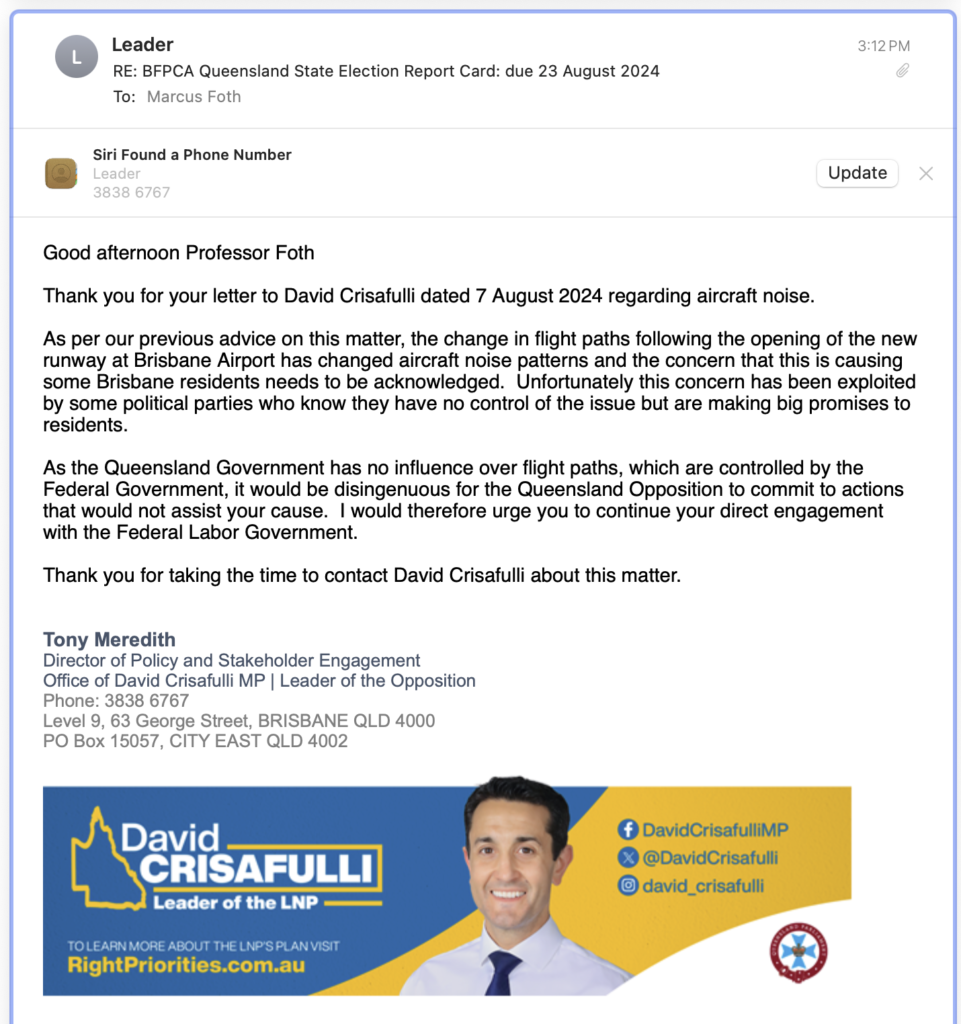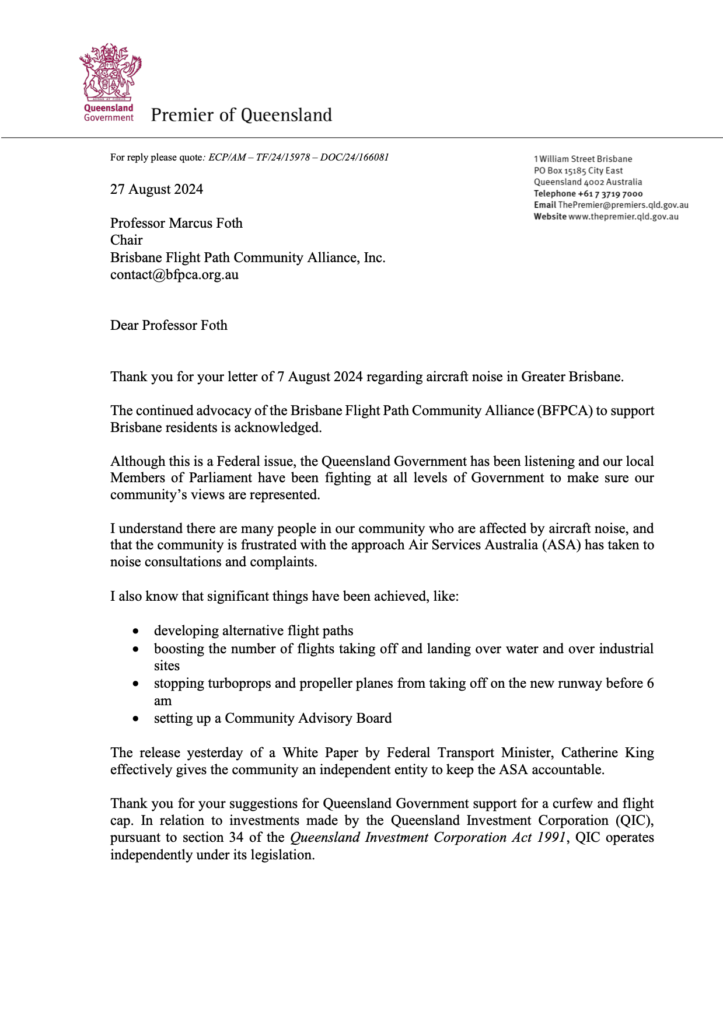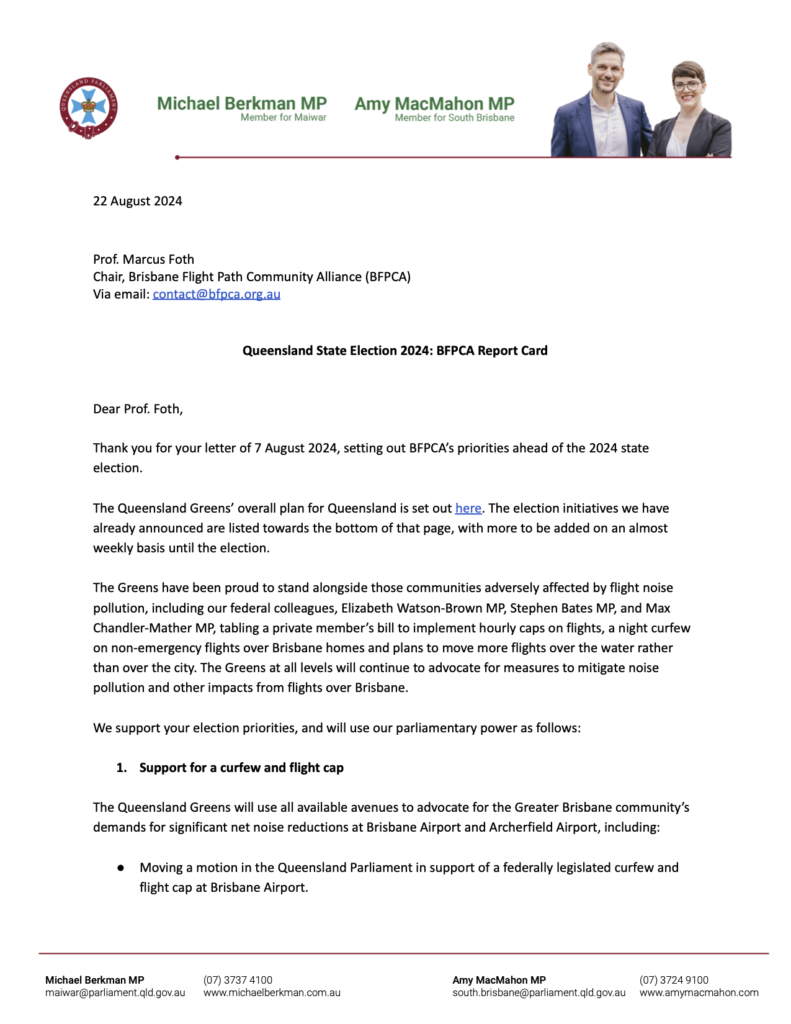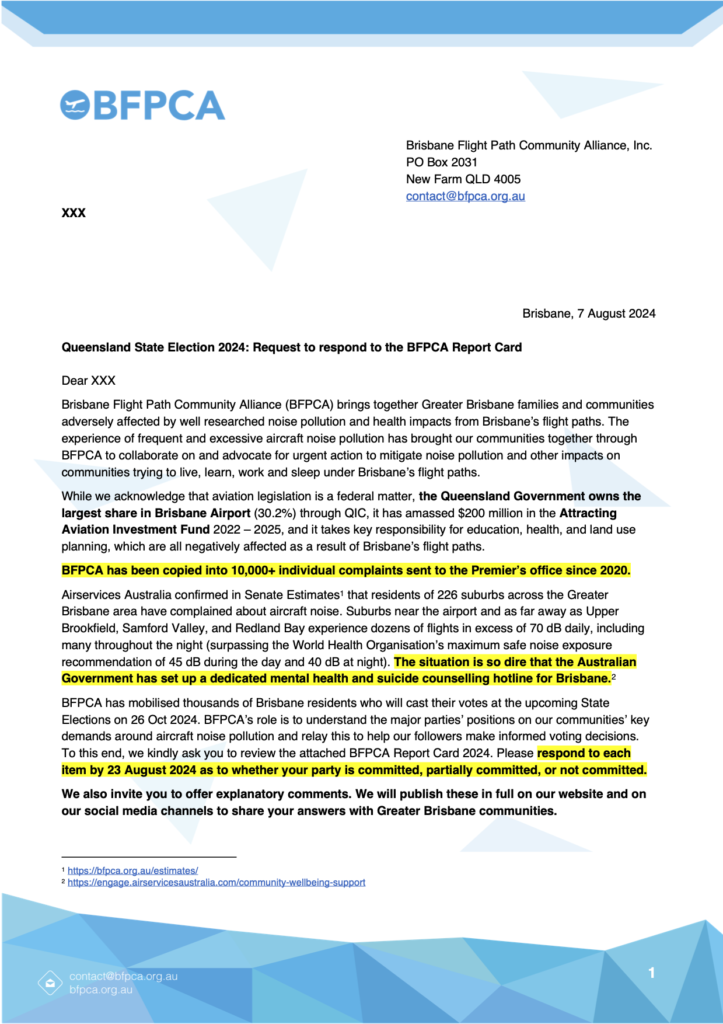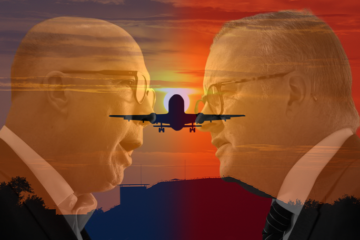The Queensland State Election on 26 Oct 2024 offers another significant chance to fight excessive noise pollution from Brisbane Airport’s flight paths. The Queensland Government owns the largest share in Brisbane Airport (30.2%) through QIC, it has amassed $200 million in the Attracting Aviation Investment Fund 2022 – 2025, and it takes key responsibility for education, health, and land use planning, which are all negatively affected as a result of Brisbane’s flight paths.
State governments can be powerful advocates for their communities, even on matters they don’t directly control. BFPCA has asked each party hoping to win at this year’s Queensland State Election whether they support Brisbane communities affected by aircraft noise. And here’s what they said. Make sure you read each party’s full response posted below.
Make your own assessment and make your vote count 🗳

Full Response Statements
Questions?
If you have questions or concerns about the answers (or lack thereof) provided by the three main parties, you can contact them:
| Mr David Crisafulli MP Leader of the Opposition Ministerial Office: (07) 3838 6767 Electorate Office: (07) 5560 6100 leader@opposition.qld.gov.au | Hon Dr Steven Miles MP Premier Ministerial Office: (07) 3719 7000 Electorate Office: (07) 3448 9300 premier@ministerial.qld.gov.au | Dr Amy MacMahon MP Member for South Brisbane Greens Spokesperson Electorate Office: (07) 3724 9100 South Brisbane Electorate Office south.brisbane@parliament.qld.gov.au |
You can also use the BFPCA one-click complaint link to send an email to all relevant politicians, senior decision-makers, and executives: bfpca.org.au/complain
Enrol to vote
The 2024 Queensland State Election will be held on Saturday 26 Oct 2024. Please make sure you enrol to vote. You can check your enrolment details here and if required update your enrolment here. Information about the location of polling booths or postal voting can be found here.
Explanation of Key Community Demands
1. Support for a curfew and flight cap
Demand: The Queensland Government will use all available avenues to advocate for Greater Brisbane community’s demands for significant net noise reductions at Brisbane Airport and Archerfield Airport. This entails:
- Issuing a State Parliament motion in support of introducing a federally legislated curfew and flight cap at Brisbane Airport;
- Leveraging relationships, political clout and communications channels available to State Government to advocate for the community’s demands for net noise reductions at the federal level;
- Making detailed submissions and representations to relevant government agencies and the federal Minister for Transport and Infrastructure to enact the community’s demands for an urgent re-design of Brisbane’s airspace, a legislated curfew, flight cap, and a Long-term Operating Plan.
Context: The Queensland Government owns the largest share in Brisbane Airport (30.2%) through QIC and controls associated positions on the BAC board of directors. Curfews operate at Sydney, Essendon, Gold Coast, Adelaide and many international airports overseas as a vital instrument to protect communities from aircraft noise pollution allowing residents to sleep at night. A flight cap in the form of an Airport Capacity Declaration for Brisbane Airport, as provided for under the Airports Act 1996, Section 195, will provide Greater Brisbane families and communities with certainty about the maximum number of flights to expect on a given day and into the future.
2. Prevent the Attracting Aviation Investment Fund from funding overnight flights
Demand: The Queensland Government will immediately prevent funding from the Attracting Aviation Investment Fund from subsidising flights arriving or departing from Brisbane Airport between 10pm and 6am.
Context: Queensland Tourism Minister Michael Healy revealed at last week’s Estimates hearing in state parliament that the government’s Attracting Aviation Investment Fund bankrolled 54 flights into and out of Brisbane Airport each week between 10pm and 6am. About half a million people are woken up by each flight every night. Airlines posting record-breaking profits neither deserve nor require any taxpayer-funded subsidies.
3. Commission independent studies into health harms
Demand: Queensland Health will commission and appropriately fund independent scientific studies into Greater Brisbane flight noise impacts with a view to establishing and mandating noise limits. These studies will examine the harms caused on the health and wellbeing of Greater Brisbane residents, and the effects on medical, aged care and other community service facilities.
Context: A new research report estimates the health and social costs at $9,000 per person per year based on a methodology from recent research on Brussels airport in Belgium. By 2032, Brisbane Airport’s excessive aircraft noise problem will drain $18.9 billion from Queensland’s health budget.
4. Commission independent studies into impacts on school children
Demand: Education Queensland will commission and appropriately fund independent scientific studies into Greater Brisbane flight noise impacts with a view to establishing and mandating noise limits. These studies will examine the negative impacts on learning and cognitive progress of children in schools and colleges affected by aircraft noise pollution.
Context: Scientific evidence confirms that chronic aircraft noise impairs children’s cognition. BFPCA estimates that more than 50,000 school children at more than 50 schools across Brisbane are learning underneath Brisbane’s flight paths.
5. Ban all lead based aircraft operations
Demand: Ban the use of leaded aviation gasoline in all aircraft across Queensland to protect public health and the environment.
Context: Avgas contains tetraethyl lead (TEL), a toxic additive phased out in automotive fuel but still used in piston-engine aircraft. The emissions from burning leaded aviation gasoline (avgas) release harmful lead particles into the atmosphere, contaminating soil, water sources, and posing severe health risks, especially to children and pregnant women. Communities near airports and flight paths, relying on tank water, are particularly vulnerable to lead exposure from aircraft emissions, highlighting the urgent need for transitioning to unleaded fuel alternatives. Aircraft using leaded fuel continue to operate daily at both Brisbane and Archerfield Airports.
6. Oppose drone delivery services and air taxis without social licence
Demand: Oppose the introduction of drone delivery services and air taxis in Greater Brisbane and across Queensland without first establishing proactive regulation, adequate oversight, and obtaining a social licence through meaningful community engagement and participation.
Context: The Council of Mayors South East Queensland (COMSEQ) has signed a Memorandum of Understanding with international air mobility company Wisk to bring autonomous flying taxis to Brisbane by the 2032 Olympics. The proposal has drawn criticism as it has been drafted without any community input, ignores noise and other pollution concerns, and prioritises the wealthy whilst failing to address the transportation needs of everyday residents.
Wing, a subsidiary of Alphabet (Google’s parent company), aims to develop a drone delivery network capable of handling millions of orders within a year. The company is already testing its drones at scale in Logan where it delivers up to 1,000 packages daily. Despite the Logan test sites already triggering a huge spike in noise complaints due to the concentrated flight paths over residential areas, Wing is aggressively expanding across South East Queensland, and has started operating in Ipswich and at the Gold Coast. These delivery drones travel at up to 100 km/h adding to the noise pollution at low altitudes with a high pitch buzzing mosquito-like noise profile. Furthermore, privatising the sky and granting control to companies like Wing raises many questions about safety, public space and regulation.
BFPCA’s Letter to the three main parties
How BFPCA develops its election score card
BFPCA uses the score card approach to helping communities understand political parties’ positions on their key demands around aircraft noise each election.
The score card is not a “How to Vote” card. It is designed to quickly summarise the positions of each party and advise affected community members of complex information in an easy-to-understand format. The score card is intended to help individuals make more informed choices. It helps people engage with the parties they support and allows them to encourage the parties to do more on our key demands.
To develop the score card, we first consult with community, our members, our committee and expert advisers (such as pilots, air traffic controllers and airspace designers) to understand the best approaches to fair and equitable aircraft noise reduction. We think carefully about what is within the power of the government level we are engaging with – federal, state or local.
We then articulate the community’s demands in ways that are directly relevant to that government and within their ability to influence. For example, we did not ask the Queensland political parties for the 2024 state election to implement a curfew because that is out of their control. However, we did ask them to advocate for a curfew on behalf of Brisbane residents to the federal government.
We send these demands to each party leader whose candidates may have a chance of winning in seats that are affected by aircraft noise in the form of a letter. The letter requests their party’s response to each demand – do they support or not support a demand?
Sometimes the responses are not direct and use tricky language to appear like a “yes” or a commitment, but on closer inspection end up being hollow. When this occurs, the BFPCA Committee assesses the responses and makes a group decision on how to best reflect this in that party’s “score.”
The BFPCA committee is made up of several directly affected community members from across greater Brisbane. Members have diverse political beliefs and support a range of parties. BFPCA takes pride in its commitment to being non-partisan, communicating and working with all parties equally.
For full transparency, BFPCA always publishes the direct responses from each party on our website.
Score cards are used by many organisations that push for change on a range of policy areas. Some examples include the Conservation Council, Australian Privacy Foundation, and Volunteering Queensland. They are an effective communication tool and have helped thousands of people in Brisbane to better understand how easily governments could reduce the impacts of aircraft noise, practically overnight.
BFPCA will continue to live up to its commitment to provide Brisbane residents with transparent information about how political parties intend to respond to aircraft noise in our city.
Authorised by M. Foth, BFPCA, PO Box 2031, New Farm QLD 4005.
